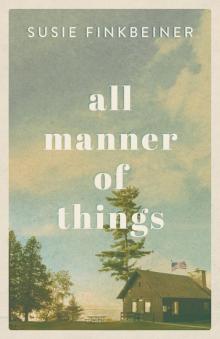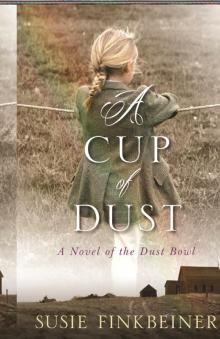- Home
- Susie Finkbeiner
All Manner of Things Page 5
All Manner of Things Read online
Page 5
She looked up at him out of the corner of her eye and shook her head, trying not to let herself smile too big. “You kids better not get any crumbs on my bedspread.”
Pulling her legs to the side, bent at the knees, she made room for us on the bed. The mattress creaked a complaint under all of our weight. I served up oversized slices of the cake, which Mom said were too much but the boys declared just right.
“Don’t tell Grandma,” Mike said, a bite of cake shoved into his cheek. “You know how jealous she gets. But this is the best cake I’ve ever had.”
“Don’t talk with your mouth full.” Mom shook her head and rolled her eyes, but still I could tell she was flattered even if she knew he wasn’t telling the truth.
It wasn’t until Mom was halfway finished eating her cake that she noticed Joel’s face. When they told her what had happened, she sighed.
“That’s what I get for having two boys.”
But then she glanced down at the rose she’d put on her bedside table and smiled.
Hey, Annie.
Don’t be too upset that we left without waking you up. This might not make a lot of sense to you, but I don’t think I could have faced you without losing my cool. You wouldn’t want to see your big brother crack up, would you? You can let me have it later.
I wanted to tell you something last night before bed, but I’m a yeller-bellied old dog.
Take a deep breath before you read on, all right? You might be angry at me and you might be upset. That’s okay. Ready?
I found Frank.
Or at least I found a way to get ahold of him when we need to.
Remember yesterday how I told you that Grandma was crying? It wasn’t because of me leaving for the Army. That didn’t bother her at all, really. She said she worried that if something bad happened to me that Frank wouldn’t find out right away. Then she asked me if I’d list him as a next of kin should I find out where he was.
I told her I’d do it in a heartbeat.
Annie, you have to promise that you won’t be mad at her. Do you swear? She’s known where he is all this time. She admitted that she lied when Mom asked her if she knew.
Please don’t be angry at her. She did what she thought was right, as odd as that might seem to you and me. I guess he made her promise to keep it a secret. Right or wrong, she kept to her word.
Well, until yesterday, that is.
Promise me one more, will ya? If anything happens to me, you’ve got to let Frank know. I’ll put his address at the bottom of this note. But only get ahold of him if you absolutely have to. We don’t want to scare him off, do we?
Don’t tell Mom, not yet at least. Got it? She’ll blow a gasket if you do and storm whatever house or apartment Frank’s holing up in and beat the snot out of him. Let’s hold off on such a spectacle until absolutely necessary. Sound good?
Write me, will you? Mom’s got the address, and I picked up a mess of stamps for you all. They’re in the drawer by the telephone.
Oh. And be extra nice to Joel for a week or so. I think this is hardest on him.
I love you (I guess).
Mike
PS: I told Bernie to hire somebody in my place. He’ll forget. You might want to remind him.
Where to reach Frank if need be:
Frank Jacobson
437 Magnolia St.
Bliss, MI
7
The morning had brought unexpected rain that hadn’t let up by lunchtime. From inside the diner I couldn’t even see across the street for the dense downpour. Thunder and lightning accompanied it, meaning any business we might have had was thin at best.
Mike had been gone six days and, as far as I knew, nobody had come in to inquire about the “help wanted” sign Bernie had hung in the window. That meant that, on top of taking orders, delivering food, and handling money, I also had to bus tables and scrub dishes. I really didn’t mind the slower pace of that Saturday morning.
Bernie, however, was of a different mind.
We’d hardly served half a dozen at breakfast and only gone through two of the four pots of coffee I’d brewed. Saturdays were usually our busiest day. The empty booths had Bernie in a mood most foul.
“That costs, you know,” Bernie said, watching as I poured the wasted coffee down the sink.
“I know,” I said.
“That’s ten cents a cup I won’t be making.” He went to wiping down the counter. “A dollar twenty each pot.”
“We always make four pots,” I mumbled.
“Not always,” he grumbled. “You should have only made one at a time. What a waste.”
“Take it out of my paycheck.” It surprised me, the edge in my voice. Mom would have been proud of me for sticking up for myself, but it didn’t seem right to me, speaking to an adult like that. I tried to apologize, but it just came out as a little squeak.
Bernie shook his head at me and went back into the kitchen, letting the door swing in-out-in-out-in behind him. I was certain he would have fired me on the spot if he’d had someone else working for him. As it was, he needed me to get through the lunch hour. If anyone came in, that was.
Putting the empty pots back near the coffeemaker, I went to the window, looking out into the rain. I hated how my hands shook, and I crossed my arms trying to still them. It bothered me how a little conflict like having made too much coffee could make me all kinds of jittery.
I tried to think of something else, something that could take my mind off being upset at Bernie.
At first, my brain wanted to worry over Frank’s address that I’d hidden in the cedar box I kept stowed away under my bed. I’d gone to the library after my shift the day Mike left, trying to figure out where Bliss, Michigan, was. But it was, apparently, so small that it didn’t even make it on the map.
The temptation to write to Frank overwhelmed me. It needled me when I tried to sleep, the address burning a hole in my little box. All there was to do was put it out of my mind completely.
So, I let my thoughts wander to Walt Vanderlaan. His second letter had arrived the day before. Lucky for me, I’d been the one to get the mail, so I didn’t have to talk to Mom about it. I’d opened it up in my room with the door locked just in case.
I tried sending you one of the coins they use over here. But someone told me it wasn’t allowed, he’d written. Maybe they’ll let me bring one back when my time here’s through.
I remember when we were kids. You had a coin collection, didn’t you? he’d continued. You had it on the bus with you one day, remember? I teased you about it and you made a face back at me for it. I think you even stuck your tongue out at me. You thought I was being mean. Really, it was because I liked you.
How are you? Please write me a letter, he’d penned at the end of his brief note. I’d like to hear from you. If you’ve got the time, that is.
I tried to think about what I’d write to him, but my thoughts were interrupted by the diner door opening to let in five men dressed in fishing hats and vests with more pockets than were necessary. I was sure that if I caught a glimpse of their tackle boxes and fishing poles that I’d see they’d spent far more than they needed to at the bait-and-tackle shop down the road.
We didn’t get too many people from out of town that came to Fort Colson. But when we did, they came to fish Old Chip in rented boats, leaving with trout or sunfish that, in their retelling, grew to salmon and bass.
The sound of rain pouring on the roof was rivaled by the deep voices of the men. They smelled of tobacco and the strong bite of aftershave and pomade. Even if we didn’t get a lot of city people coming to town, I still could sniff them out.
“Looks like our table’s open,” one of the men said, winking at me. He pointed at table two. “We usually sit there.”
“Go ahead. I’ll be right with you,” I told them.
“We don’t need menus, honey,” another said. “You just tell him back there that we’re here. He knows what we want.”
“All right,” I said.
“Coffee?”
“Sure thing.”
I got a fresh pot of coffee brewing and went to the pass-through window between the dining room and the kitchen.
“There’s a table of men here,” I said. “They told me you’d know what they would want.”
He looked around me at them and nodded. “Rare?”
“I don’t know.”
“Listen, these men come a couple of times every year. They order a lot and tip well,” he said, meeting my eye. “Still, I want you to watch out for them.”
“Why?”
“Just do.”
He turned and got started on the steaks, and I carried the coffeepot to the table, reaching between the men to pour it.
“Now, where’s the kid who usually takes care of us?” a man with slicked-back dusty-colored hair asked. “Mark, right?”
“Mike. He left for basic training last week.” I held the pot in front of me.
“Drafted?”
“No. He enlisted.”
“Well, either way I hope he gives them heck.”
“My boy’s over there,” another of them said, squinting at me over his mug. “You believe that? I’ve got a kid old enough to be in the Army.”
“I wouldn’t have guessed,” I said, lying.
“Now, what’s your name, sweetheart?” the squinting man asked, his eyes flicking up and down my body so fast I wasn’t sure if they really had.
“Annie,” I answered, trying to hide how uncomfortable I felt.
“That’s a pretty name.”
“Thank you.” I smiled.
“And that’s a pretty smile.”
“Your food should be out soon.”
As I walked away, one of them called after me, “Oh, Don, you went and scared her off. Honey, he don’t bite.”
I looked over my shoulder and tried to laugh even if I didn’t think it was funny. The man named Don followed me with his eyes the way I thought maybe a fox would watch a rabbit.
Waiting behind the counter, I was glad it didn’t take long to cook a rare steak. Bernie took three of the plates to the table, leaving only two for me. With him there, the men were quieter, paid me less attention.
After giving them a little time to eat their food, I took the coffee around and refilled their cups. When I got to the squinting man, he looked up at me. I could see from his face that he’d been good looking at one time. Hints of it still lined his jaw and sparkled in his bright eyes. His wasn’t an unkind face, but there was something about him that made me feel antsy, unsettled.
He put his meaty fingers around my wrist, the one not holding the coffeepot, and he pulled me closer to him. He wrapped his arm around my waist.
“You’re doing a good job,” he said. “We like you. Don’t we, boys?”
The men at the round table guffawed and nodded.
“You don’t have to be so tense,” Don said. “Lighten up. I swear we won’t hurt you.”
“Yes, sir,” I answered, my voice shaking and wrist sore from how hard he’d held on to it.
“I wonder what you would look like without those glasses.” He narrowed his eyes. “You ever go without them?”
I swallowed, not knowing what to say to him and trying to think of a way to make him let go of me. My mind had chosen the very worst time to go absolutely blank.
“Oh, never mind. How about you just get us some pie, huh?” He smirked at me while he moved his hand slightly along my lower back. “With a little ice cream too.”
He let me go, and I took a step away from him. Just then I felt his hand tap my rear end and heard all the men at the table erupt with laughter.
My instinct was to turn and slap him across the face like Katharine Hepburn would have in a movie. Then I thought about slugging him in the nose the way Mike would have wanted me to. It occurred to me that I could give him an earful the way Mom would have done. But before I could do any of that, Bernie slammed through the kitchen door and stormed across the room, white blind rage in his eyes.
“Did you just touch her?” he asked, his voice a growl. “I’m talking to you.”
The man named Don leaned back in his chair and jutted out his chin. “And what if I did?”
“Get out of my diner.”
“Oh, come on.” The man scowled and looked like a kid who’d gotten caught cheating on a test.
“I mean it.” Bernie went around the table and hooked his hand in the man’s bent elbow, pulling him to stand, sending the chair banging against the wall. “Get out.”
“Listen here . . .” the man said in protest.
“You don’t touch a lady like that.”
“Who did I touch?”
“I’m not stupid and I’m not blind.” Bernie pulled him to the door.
“You can’t make me go out there,” Don said. “It’s raining.”
“Tough.” Bernie pushed the door open. “Don’t come back.”
The man tried to shove him off, but Bernie was at least a head taller and a good deal broader. He turned and looked at the men at the table.
“Did any of you stand up for her?”
Not a one of them said a word.
“No?” he asked. “Then you all go too. You aren’t welcome here anymore.”
He held the door for them until they’d all exited, their lunches half-eaten and the bill left unpaid. Shutting the door, Bernie locked it and turned the sign to “closed” before going back to the kitchen.
I didn’t know what else to do, so I started bussing the table, carrying the dishes to the kitchen to scrape and wash them. There I found Bernie standing over the counter, his fingers curled around the edge. He breathed in and out through flared nostrils. His face was the brightest red I’d ever seen it.
“You okay?” he asked, his voice still gruff, his jaw still set.
I nodded, lifting the stack of plates onto the counter beside the sink.
“Some men . . .” he started, then bit at his lip. “Well, they don’t respect women. They think they have power over them.”
“I know.” I shifted my weight and shoved my hands into the pockets of my apron, not wanting to talk to him about what had happened, I was so embarrassed.
“Don’t let anybody treat you like that, all right?” He turned his face and caught my eyes. “You fight back.”
“Okay.”
“You have two brothers,” he said. “I assume you know how to punch.”
I nodded.
“Aim for the nose.” He stood up straight and looked at the sink. “I’ll do up those dishes. You can go home.”
I reached behind me to untie my apron and couldn’t seem to hold back the tears. Bernie cleared his throat before taking the hanky out of his jeans pocket.
“It’s clean,” he said, handing it to me.
“Thanks,” I managed.
“What a day, huh?”
I nodded. “I’m sorry,” I said, rubbing the soft cotton under my eyes.
“You didn’t do anything wrong.”
He turned and got started on the dishes, dumping the half-eaten steaks and piles of fries into the trash. I could almost see him calculating how much money he’d lost that day.
“I’ve got a kid coming to fill in for Mike,” he said, his back to me. “He starts on Monday. I might need you to teach him the ropes.”
“Okay.”
“I’ll see you at church tomorrow.”
I grabbed my umbrella and stepped out the back door to the alley, grateful that the rain had eased up, even if only a little. Looking up at the clouds where the sun tried to break through, I thought about how nice it would be to see a rainbow.
Dear Walt,
Thank you for your letters. I apologize for being so late in writing back. I’ve been working a lot so far this summer. Also, Mike left for basic training a week ago.
It’s a sorry excuse, I know, but I’ve been a bit busy.
Not much is new around Fort Colson, aside from Mike being gone.
I realized the other day tha
t I never had the chance to congratulate you on your engagement to Caroline. You two make a nice couple and I wish you all the happiness possible.
You’re on my prayer list, where you’ll stay until you come home.
Sincerely,
Annie Jacobson
8
Quietly as I could, I got myself ready for work, waiting to put my shoes on until I was out the door so I wouldn’t wake Mom or Joel. Banana in hand, book in the bend of my elbow, shoes dangling from fingers, I stepped out onto the front porch.
The air was crisp that morning in a way that would fade as the day wore on. The sky held the satiny color of blue that promised an explosion of vibrant hues in just a matter of minutes as the sun lifted up, breaking the darkness by inches.
Since I was small, I’d loved the still of morning. It was why I didn’t mind taking the job at Bernie’s. I could have time to myself first thing, without anyone interrupting. Early mornings were the best for solitary walks because nobody else in Fort Colson got up so early as I did. Except for Bernie, but he just lived in an apartment above the diner. There was no chance of running into him on the way to work.
Before stepping off the porch, I shoved my feet into my low-top sneakers that were still tied from the day before.
Mom hated that I wore those shoes. She hated even more that I’d stolen them from Joel when his feet had outgrown them in the winter. He’d only gotten to wear them once or twice.
With a lazy, in-no-hurry stride, I made my way down our front walk and onto the street, taking in the morning and glad for the sweater I’d grabbed on my way out of my bedroom.
Checking my watch, I saw that I had a few minutes to sit by Old Chip. I made my way down the dirt road that served as a public access to the lake and sat myself down on the rickety dock.
It was light enough for me to see the letter I’d been writing for the past few days. I would have been embarrassed to admit that I’d drafted more than one edition of the note, especially for as little as I’d written in it. Most of the drafts had ended up crumpled and tossed in my bedroom waste paper basket, hidden under tissues so that my mother wouldn’t find and read them.

 All Manner of Things
All Manner of Things The Nature of Small Birds
The Nature of Small Birds Paint Chips
Paint Chips My Mother's Chamomile
My Mother's Chamomile A Cup of Dust
A Cup of Dust